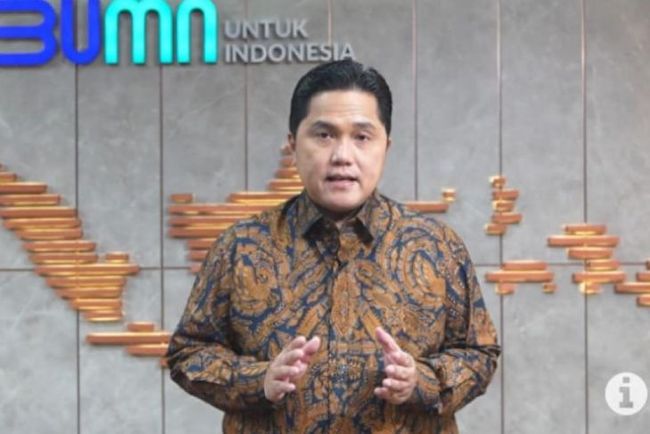
 |
|
|
GCG involves regulating, managing, and supervising a sustainable business control process to increase share value, as a form of accountability to shareholders without ignoring the interests of stakeholders, including employees, creditors, and the community.
In Indonesia, the implementation of GCG has been mandated for all SOEs under Erick Thohir's leadership as the Minister of SOEs.
According to Thohir, all SOEs must apply the five GCG principles outlined in the SOE Minister's Regulation Number PER-09/MBU/2012, Amendments to Regulation Number PER-01/MBU/2011 on the Implementation of Good Corporate Governance in SOEs.
- The first GCG principle involves transparency in decision-making and disclosing material and relevant information regarding the company.
- The second principle is accountability in terms of clarity of function to ensure the management in the company is working effectively.
- The third principle pertains to the responsibility of the company's management to obey applied law and regulations.
- The fourth is independence in managing the company in a professional way without conflict of interest and pressure from certain parties.
- The last is fairness or justice and equality in fulfilling stakeholders' interests and rights that arise based on agreements, laws, and regulations.
Under Thohir's leadership, several SOEs have implemented GCG. To comply with GCG principles, state-owned energy company PT Pertamina has increased the involvement of legal institutions in its business processes and company projects.
Pertamina President Director Nicke Widyawati says during 2020-2021 it carried out strategic cooperation with several law enforcement agencies, including the Indonesian National Police (Polri), the Financial Transaction Reports and Analysis Center (PPATK), the Government's Development Finance Comptroller (BPKP), the Indonesian Attorney General's Office, and the Corruption Eradication Commission (KPK).
Pertamina and PPATK established cooperation in data exchange for investigations for preventing and eradicating money laundering and other criminal acts in the company, she said. Pertamina will also continue to collaborate with BPKP for company audits, she added.
Meanwhile, Pertamina's cooperation with the National Police involves supervising and assisting procurements for strategic projects, such as the construction, development, and operation of oil refineries and petrochemicals.
State-owned port operator PT Pelindo I has also implemented GCG through mutual cooperation with KPK for the handling of complaints of criminal acts, such as corruption. President Director Dani Rusli Utama said that this mutual cooperation is in line with the principle of GCG applied by Pelindo I in its work activities.
Pelindo I's anti-corruption commitment has also been integrated with 26 other SOEs through the Whistleblowing System. The Whistleblowing System is an App for reporting violations of the code of ethics, regulations,and legal provisions, he said. The App does not reveal the identity of the whistleblower and aids fair reporting of corruption.
The collaboration with KPK is a form of the ministry's support for SOEs as a partner in preventing corruption, Thohir said. "We are committed to continued transformation, transparency, and professionalism in the Ministry of SOEs, as well as for our SOEs. One of our breakthroughs in transparency is opening all SOEs' financial reports to President Joko Widodo and the Finance Minister."
During Thohir's term, the SOEs Ministry has made other major breakthroughs in bureaucratic reform by making bold moves. To simplify bureaucracy, Thohir reduced the number of deputies from seven to three (focusing on legal, human resources and finance), and appointed two deputy ministers to handle the portfolios of 142 SOEs.
Evaluating SOE subsidiaries, Thohir contends that they can reduce the profits of the main company, which may already be excessive, and he further says he will issue ministerial regulations regarding the establishment of SOE subsidiaries.
Eventually, the business model of each SOE will be improved. SOEs must go back to their business core to avoid similar businesses overlapping each other, he explained. Thohir said he will also encourage SOEs' expansion in foreign markets to boost revenue.
Furthermore, troubled companies will not be liquidated, according to the previous policy, but will be merged instead, the minister added. He pointed out how his ministry successfully engineered the merger of state-owned Islamic banks into a single entity called Bank Syariah Indonesia, or BSI.
BSI was formed through the merger of three Sharia banks owned by the State-Owned Banks Association (Himbara): Mandiri Sharia, BRI Sharia, and BNI Sharia. With the formation of BSI, for the first time, Indonesia finally has a large Islamic bank, with assets totaling around Rp 247 trillion, Thohir said.
BSI has also received official permission from the United Arab Emirates to open a branch in one of its Islamic finance centers, Dubai, he highlighted. The recognition has brought BSI a step closer to achieving its goal of becoming a key player in the global Islamic banking industry, he remarked.
Thohir said his ministry also successfully merged four state-owned port operators Pelindo I, Pelindo II, Pelindo III, and Pelindo IV into one company, with each operating ports in different areas. The Pelindo merger, which had been attempted for two decades, was successfully realized in October 2021, he noted. The merger aimed to reduce logistics costs in Indonesia, which were still higher than in neighboring Asian countries.
With this merger, Pelindo has emerged as the eighth-largest container terminal operator in the world, with a total of 16.7 million TEUs, and become one of the main players in the ports sector, with assets totaling Rp 112 trillion, Thohir said. This merger also aims to boost connectivity and efficiency to lower national logistics costs in an effort to further drive the competitiveness of Indonesia's industry sector, he said.
Social expert Budi Muliawan said all of these transformations of SOEs were realized through strategic plans and the well-organized vision of leaders. Leaders must be able to internalize GCG in modern corporate principles, he said. In leading SOEs, leaders should also have a sense of crisis and a sense of belonging.
Reporter: Resinta Sulistiyandari; Editor: Rahmad Nasution. (c) ANTARA 2022.
ANTARA/HO: https://www.acnnewswire.com/topimg/Low_Antara202202241.jpg
Copyright 2022 ACN Newswire. All rights reserved. www.acnnewswire.com
source https://www.acnnewswire.com/press-release/english/73260/